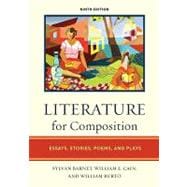The new edition of Barnet's Literature for Composition continues to offer superior coverage of reading, writing, and arguing about literature and a deep anthology of readings presented in Sylvan Barnet's signature accessible style.
A new chapter one gives students a crash course on writing an effective essay. Six new student essays provide helpful models of student writing on a wide array of topics with nineteen essays in all. Two timely thematic units have been added: "The World Around Us" and "The Sporting Life." The new2009 MLA guidelines are included in an appendix for guidance on writing papers.
Literature for Composition is based on the assumption that students in composition or literature courses should encounter first-rate writing not simply competent prose but the powerful reports of experience that have been recorded by highly skilled writers of the past and present, reports of experiences that must be shared. Our view is not original.
A thousand years ago in Japan, Lady Murasaki (978'-1026) wrote a scene in The Tale of Genjiin which some of her characters talk about reading fiction, and one of them offers his opinion as to why an author writes: Again and again writers find something in their experience, or see something in the life around them, that seems so important they cannot bear to let it pass into oblivion. There must never come a time, the writer feels, when people do not know about this. We assume that you share our belief that the study of such writing offers pleasure and insight into life and also leads to increased skill in communicating.
The ninth edition focuses on argument and evaluation, not only in the case studies but also in the topics (headed "Joining the Conversation: Critical Thinking and Writing") that follow every reading. The authors emphasize the importance of questioning our assumptions--a key principle in critical thinking--and also emphasize the importance of providing evidence in the course of setting forth coherent, readable arguments.
The book is rich in photographs, paintings, and facsimiles of manuscripts. The images are chosen to enhance the student's understanding of particular works of literature. For example, we include photos of Buffalo Bill and a facsimile of a draft of E. E. Cummings's poem about Buffalo Bill (to our knowledge, never before published in a textbook). Similarly, we include previously unpublished typescript pages of Faulkner’s “A Rose for Emily," thereby helping students to think about the kinds of choices and changes that a serious writer makes.








